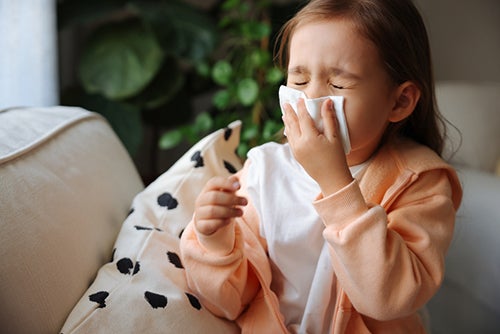Allergies? Don’t Let Them Spring Up & Slow You Down!
April 18, 2024
By: WakeMed Children's Hospital
Categories: Primary Care, Children's, Urgent Care
Tags: hay fever, Allergies, spring allergies
When the wonders of nature bloom, airborne allergens also increase and can turn an otherwise beautiful time of year into utter misery for allergy sufferers. Sneezy, itchy, watery-eyes, rashy, runny nose symptoms of seasonal allergies are quite common. If you’re among those affected, you’re not alone.
According to the Asthma and Allergy Foundation of America, in 2021, roughly 81 million people in the United States were diagnosed with hay fever (seasonal allergic rhinitis). This means approximately 26% of adults (67 million) and 19% of children (14 million) were affected.
Triggers & Treatment
Pollen, trees, flowers and grass are a few common allergen triggers. Many people feel worse in early spring when the pollen count is high. You might notice yellow pollen is covering every outdoor surface around the same time that symptoms flare up.
Treatment typically involves reducing exposure and using medication recommended by your doctor when needed to alleviate symptoms. Depending on the severity of symptoms and amount of exposure, regular injections (immunotherapy) over a period of years may be recommended to reduce and stop allergy symptoms.
Could it be a Cold?
Some symptoms of allergies and the common cold overlap. These include sneezing, congestion, nasal discharge, coughing and fatigue. Additionally, allergies may cause watery eyes, itchy nose/throat/eyes, rash, hives and postnasal drip. For some, allergies can even cause vomiting and trouble breathing.
At times, it can be hard to know if you’re dealing with allergies or a cold. A cold is typically accompanied by a sore throat, body aches and headache and/or a fever.
Environmental Changes
Relocating to another area may or may not improve or worsen allergy symptoms. If an allergen exists in the new location, then you’re likely to continue to experience seasonal symptoms. However, if a specific allergen (trees, grass, etc.) is not in the new locale and you’re not allergic to something else, there should be a noticeable improvement and possibly a complete elimination of the seasonal allergy symptoms.
Allergies & Athletes
Athletes struggling with allergies might find that nasal congestion causes less optimal performance, especially during longer periods of activity. However, Shereen Alavian, MD, of Pediatric Primary Care, says that movement is important and reduces symptoms for many who are dealing with seasonal allergies because the increased blood flow during physical activity helps flush out allergens. Indoor exercises that focus on breathing can also be helpful. Athletes should pay attention to their bodies, take breaks when necessary, and be sure to get plenty of sleep, water and nutritious food.
“Exercise-induced asthma can be triggered by allergens so watch for a worsening cough or breathing difficulty during exercise and seek medical care to find ways to better manage allergies before continuing with athletic activities,” says Dr. Alavian. “It is important to pay attention to the respiratory condition of children and take them to their pediatrician or an urgent care if symptoms are getting worse.”
Natural Remedies
When you’re suffering from allergies, symptom relief is likely your top priority. Here are tips for
reducing symptoms:
- Close windows.
- Clean regularly to keep dust from collecting in your home.
- Wash clothes after being around a trigger.
- Shower and clean your hair before bed.
- Stay indoors as much as possible during high pollen counts.
- Try limiting exercise to inside activities or times when allergens are high.
Severe Symptoms Slowing You Down?
Prescription medications are a possible solution if over-the-counter remedies are not helpful. Contact WakeMed Primary Care, Pediatric Primary Care, Urgent Care or MyCare 365 providers to address concerns and seek relief for seasonal allergies symptoms.
“A referral to an allergist may be made if symptoms are severe or cause significant, ongoing interruptions to daily activities. For the majority of patients, their primary care provider can help with management and alleviation of symptoms for seasonal and environmental allergies,” says Dr. Alavian.
About Shereen Alavian, MD
 As a general pediatrician, Dr. Alavian cares for children from newborn to 22 years of age. She thoroughly enjoys well visits of all ages, especially discussing with families what they can do to assist in their child's development at particular ages and stages and how they can help their child reach their potential and identify their interests and talents. When seeing children for sick visits, Dr. Alavian values educating families about their child’s illness and empowering them to administer home care.
As a general pediatrician, Dr. Alavian cares for children from newborn to 22 years of age. She thoroughly enjoys well visits of all ages, especially discussing with families what they can do to assist in their child's development at particular ages and stages and how they can help their child reach their potential and identify their interests and talents. When seeing children for sick visits, Dr. Alavian values educating families about their child’s illness and empowering them to administer home care.
She speaks Spanish and enjoys working with Spanish-speaking families. She is also committed to serving minority populations and those living in rural settings. Dr. Alavian values listening to parental concerns because she believes parents know their child best. She also involves and empowers children to advocate for their own care as they grow.
When not at work, Dr. Alavian loves spending time outside with her husband, riding her horse, or playing with her cat. She also does volunteer work in Raleigh and other parts of eastern North Carolina supporting youth spiritual empowerment and community-building efforts.
This blog is adapted from an article in our Families First Magazine. Interested in getting future issues of Families First delivered to your home? Subscribe here.